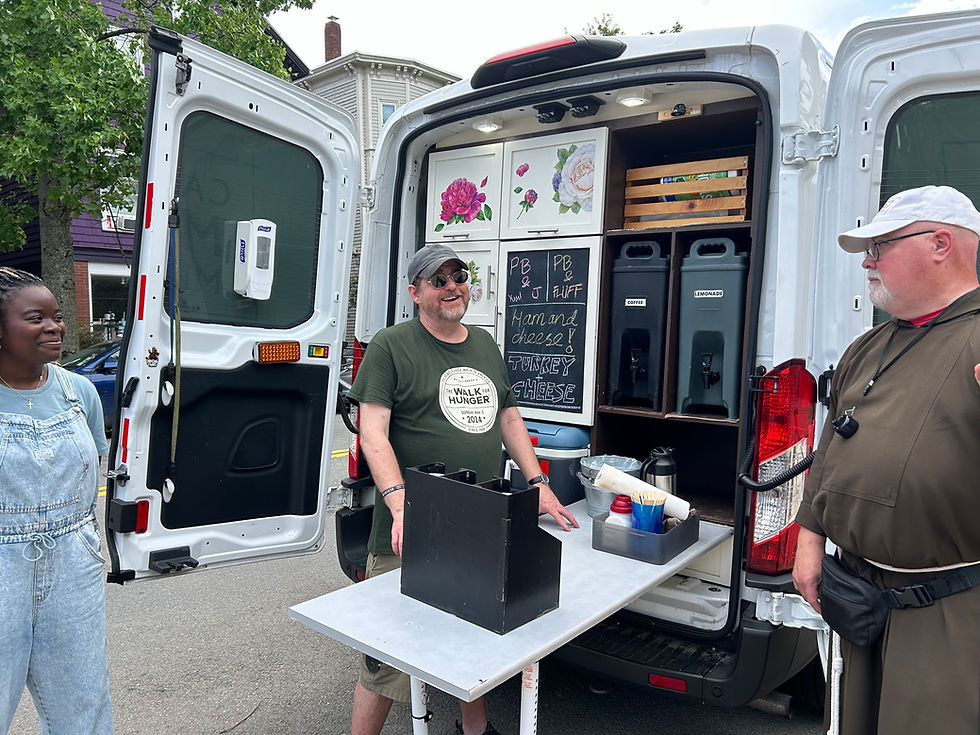Living simply: Unplugging from the Consumptive Society
- Elizabeth

- Oct 16, 2024
- 3 min read
Updated: Oct 24
This October we have a cohort going through the Lazarus at the Gate curriculum. If you haven’t done LATG or don’t know about it - it is a Bible study that challenges participants to understand the Biblical foundation for generosity, simple living, and just consumption.
BFJN offers the curriculum for free on our website – check it out!
I have done LATG with five different groups over the past 10 years and I always learn something new and find great challenge and encouragement in the community learning alongside me.
This group just had our 3rd session. The theme was living simply. We discussed how the new testament primarily presents wealth as spiritually dangerous. In this context we considered what it would look like for us to live more simply – requiring and spending less. We brainstormed some big and small changes we could make and examined underlying assumptions and values that sometimes cause us to desire more than we need.
I recently reread Richard Foster’s Freedom of Simplicity and so much of what he discusses resonates with our recent LATG discussions. I wanted to share some of what he had to say about resisting consumption. Freedom of Simplicity was written almost fifty years ago. Foster spends a lot of time talking about the toll technology can take on us and how it disconnects us from much of what really matters. The technology of 50 years ago seemed potentially dangerous to Foster – its power to lure us away from what was truly important and to bring us messages convincing us of our inadequacies and provide the right things to fill the gap. How much more so today! I recently heard a statistic that today we see more ads in a year than people 50 years ago saw in a lifetime!<1>
Here are some of Foster’s suggestions for “Unplugging from the Consumptive Society”<2> (which he stresses are not meant to be rules – so we can feel free to adapt and apply as needed to our contexts):
Greet phony commercials with sarcastic laughter – a participant in our Rich Christians in an Age of Hunger group in the spring shared that friends of hers actually practiced this with their children and I love it! They laughed at commercial together. What impact might it have if when on TV, on our phones or out and about in the wide world we see ads that are blatantly dishonest and/or trying to foist unnecessary products we were to laugh out loud at the ridiculousness.

Waiting to buy – when we deicide we do want to make a purchase Foster advises we wait, he suggests a week. We could use this time to hold the plan before the Lord and our own judgment to give space to confirm or oppose the decision. For those of us used to clicking on the things we want within seconds of conceiving of the need and expecting the arrival of the item as soon as that same afternoon this may feel particularly onerous. I think maybe this demonstrates why this practice might be especially helpful for that group (in which I do include myself!).
Emphasize being over having – “learn the wonderful truth that to increase the quality of life means to decrease material desire.”<3>
Make recreation healthy, happy and gadget free – this one speaks for itself. Some of my favorites - taking a walk,

sitting by a fire (s’moores preferred but not required), playing a board game. So many options!
Buy things for their usefulness not the status they might convey – though initially we might think we are immune to the temptation to literally buy into the idea of displays of status given the amount of media we are inundated with that try to convince us of the need for the latest and greatest we would all do well to interrogate our desires and work to free them fully of this tendency.
Living more simply is especially challenging in today’s world. The choice to do so is truly radical and requires intention (it will not happen by accident), is much easier in community (surrounding ourselves with like-minded people to encourage and challenge us) and can bring to us a richness that is deeper and far more profound that anything we could find in the pursuit of possessions and wealth.
<1> https://www.windowstill.com/the-surprising-number-of-advertisements-were-exposed-to-daily/posts/#:~:text=In%20the%201970s%2C%20the%20average,10%2C000%20ads%20every%20single%20day. <2> Foster, R. J. (1981).
Freedom of simplicity,
145 – 150. <3> Foster at 145




Comments